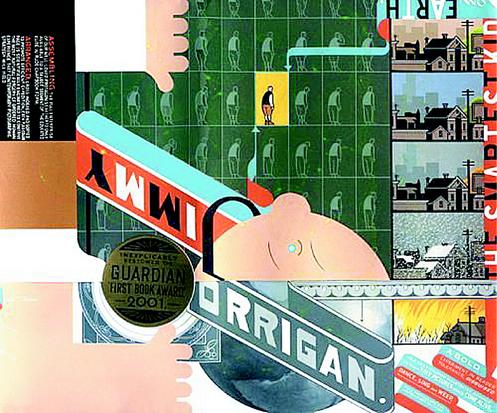Ware's strip was eye-catching, even if it wasn't particularly easy to read. Loaded with microscopic text, peculiar diagrams, bizarro cutouts and frequent surreal anachronistic digressions, Ware's weekly weirdness irritated me at first. His serialized story about a lonely, middle-aged loser who suffers severe social anxiety was extremely depressing. I'd just arrived in town, and I didn't know a soul. Did I really want to subject myself to this esoteric, morbid stab at comic artistry?
No, I did not.
Eventually, I started making friends, though. When one of those friends pontificated at length on the brilliance of Ware's work, I started to pay closer attention. After a while, I got into it.
Ware's work is depressing and sometimes disgusting, but it's also extremely funny once you get used to his disturbed brand of humor. He also uses the medium unlike any other comic artist I've ever read. Ware has an amazing ability to make the boring minutiae of daily life interesting. The drip of a faucet. A plate of neglected french fries. Snow falling in a gauzy sheet over a station wagon. The sounds a woman makes while chatting and munching on an apple. Ware also morphs history, dreams and fantasies into his strip with effortless fluidity, infusing his story with a psychic realism that's almost too real to tolerate.
More than anything, though, it's Ware's cartooning tricks that mesmerize the reader. As a visual artist, he's capable of almost anything. Despite the depressing subject matter, almost every page contains some incredible optical jack-in-the-box for your amusement.
When these strips were collected into a book and published a couple years ago, literary critics all over the English-speaking world tripped over themselves in their eagerness to praise Ware's achievement. To my knowledge, such accolades have never been heaped on a comic artist. The Wall Street Journal actually compared Jimmy Corrigan: The Smartest Kid on Earth to James Joyce's Ulysses. The New York Times said Ware's book may well be the single greatest work of comic art ever made.
This incredibly elaborate book has just been released in paperback, making it accessible to ordinary shlubs like you and me. Was all that praise justified? Mostly, I think it was.
The comparison to Ulysses is more apt than it might seem. Ware's hero is pathetic, boring and, at times, thoroughly revolting. I wouldn't want to spend 10 seconds around that loser. Yet like Joyce's Leo Bloom, Ware miraculously manages to bestow on his otherwise irritating protagonist the mantle of cosmic heroism. It's quite a feat.
Like Ulysses, too, a careful reading of the book will be rewarded. Use a magnifying glass. Read the fine print. You'll be amazed at what you find.









